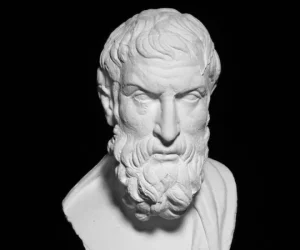The Personal Kaizen community believes simple improvements in our health and mindset will significantly improve the quality of our life. We have recently studied works of Stoic philosophy that we believe can be inspiring to our followers. We have shared 5 Ways Stoic Philosophy Improves your Mood and Attitude and summarized passages from On the Shortness of Life by Seneca. We’ve also shared some simple Meditations from Marcus Aurelius. This week we highlight Stoic teachings from the handbook by Epictetus: Focus on What You Control!

Epictetus is considered one of the founders of Stoic philosophy and believed philosophy was a way of life. He taught that individuals are responsible for their own actions and should accept with calm whatever happens outside one’s control.
Epictetus was born into slavery in AD 50 and lived in both Rome and Greece. No writings by Epictetus are known, but his teachings were written down and published by his pupil Arrian in The Discourses and the Enchiridion, or Handbook. Here are selected passages from the Enchiridion that encourage us to focus our thoughts on what we control. The Personal Kaizen team shares our thoughts and ideas for application after each quote.
Selected Quotes from the Enchiridion, or Handbook by Epictetus
Some things are in our control and others not. Things in our control are opinion, pursuit, desire, aversion, and, in a word, whatever are our own actions. Things not in our control are body, property, reputation, command, and, in one word, whatever are not our own actions.
Epictetus sums up one of the core principles of Stoicism in this single statement. We all must focus on what we control and ignore things outside our control. I find the examples of what we do and don’t control helpful. Take a moment to reflect on these.
Men are disturbed, not by things, but by the principles and notions which they form concerning things.
It isn’t what happens to us but how we respond that matters. Look at the definition of the word, stoic:

Stoic philosophy isn’t about not showing your feelings. It is based on realizing that what happened to us is outside of our control. When bad things happen to you, realize they cannot be changed but you are fully in control of your response. Choose to accept the results and not blame yourself!
Don’t be prideful with any excellence that is not your own.
Again, temper your response. Your good fortune is probably due more to luck than skill. When good things happen to you, accept the results and realize you likely had fortune and luck on your side this time!
Remember that you must behave in life as at a dinner party. Is anything brought around to you? Put out your hand and take your share with moderation. Does it pass by you? Don’t stop it. Is it not yet come? Don’t stretch your desire towards it, but wait till it reaches you. Do this with regard to children, to a wife, to public posts, to riches, and you will eventually be a worthy partner of the feasts of the gods. And if you don’t even take the things which are set before you, but are able even to reject them, then you will not only be a partner at the feasts of the gods, but also of their empire.

Epictetus shares with his students some examples of how to act in a Stoic manner.
- Use moderation
- Accept negative outcomes without trying to change them
- Be patient and wait for good fortune to come your way
- If you can be strong-willed enough to pass on certain pleasures you will have fewer needs and fewer regrets in life
Let death and exile, and all other things which appear terrible be daily before your eyes, but chiefly death, and you win never entertain any abject thought, nor too eagerly covet anything.
Sometimes when you consider “what is the worst that can happen” you feel better when something lesser occurs. For example, if you total your car in an accident but no one is hurt respond with “at least no one was hurt” rather than “we totaled the car!”
If you ever happen to turn your attention to externals, so as to wish to please anyone, be assured that you have ruined your scheme of life.
Again, Stoics focus on what is directly influenced and controlled, not what happens outside of one’s control. Do things that will please yourself, and don’t worry about what others think.
If anyone tells you that such a person speaks ill of you, don’t make excuses about what is said of you, but answer: ” He does not know my other faults, else he would not have mentioned only these.”
This is a wonderful retort! And truthful. And Stoic.

When you are going to confer with anyone, and particularly of those in a superior station, represent to yourself how Socrates or Zeno would behave in such a case, and you will not be at a loss to make a proper use of whatever may occur.
Epictetus encourages you to reach out and learn from others using the Socratic Method. Seek to learn from your dialogue. Be genuinely curious and seek to learn from the conversation.
In parties of conversation, avoid a frequent and excessive mention of your own actions and dangers.
Epictetus implores us to be humble.
If you are struck by the appearance of any promised pleasure, guard yourself against being hurried away by it; but let the affair wait your leisure, and procure yourself some delay. Then bring to your mind both points of time: that in which you will enjoy the pleasure, and that in which you will repent and reproach yourself after you have enjoyed it; and set before you, in opposition to these, how you will be glad and applaud yourself if you abstain. And even though it should appear to you a seasonable gratification, take heed that its enticing, and agreeable and attractive force may not subdue you; but set in opposition to this how much better it is to be conscious of having gained so great a victory.
We believe Epictetus’s lesson here is to consider the results of your actions. Many of us take actions based on an initial pleasure, e.g., eat the big bowl of ice cream because it will taste great. Epictetus encourages us to consider the second pleasure – the future pleasure we will obtain. This is the feeling of pride at our use of willpower for not eating the ice cream rather than a feeling of guilt for eating it!
When any person harms you, or speaks badly of you, remember that he acts or speaks from a supposition of its being his duty. Now, it is not possible that he should follow what appears right to you, but what appears so to himself. Therefore, if he judges from a wrong appearance, he is the person hurt, since he too is the person deceived. For if anyone should suppose a true proposition to be false, the proposition is not hurt, but he who is deceived about it. Setting out, then, from these principles, you will meekly bear a person who reviles you, for you will say upon every occasion, “It seemed so to him.”
Epictetus wants us to not only ignore what others think about us but also to excuse them for their feelings.
These reasonings are unconnected: “I am richer than you, therefore I am better”; “I am more eloquent than you, therefore I am better.” The connection is rather this: “I am richer than you, therefore my property is greater than yours;” “I am more eloquent than you, therefore my style is better than yours.” But you, after all, are neither property nor style.
What is really, truly important is life are neither possessions nor eloquence. Virtue is the goal of Stoicism, and of life.
Never call yourself a philosopher, nor talk a great deal among the unlearned about theorems, but act conformably to them.
This is another one of the basic Stoic teachings by Epictetus. What we do is more important than what we say.
Summary
This handbook has many great Stoic teachings by Epictetus and is an easy read. We encourage you to apply these principles to your life.




